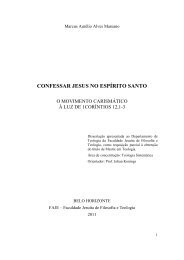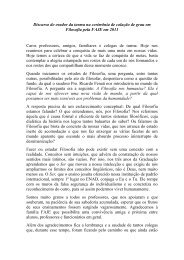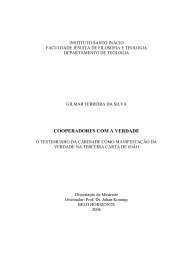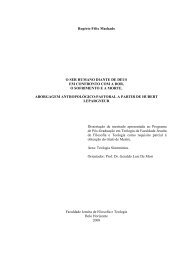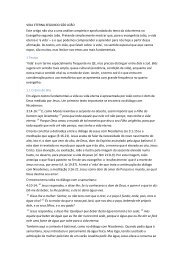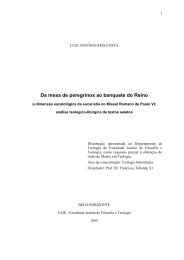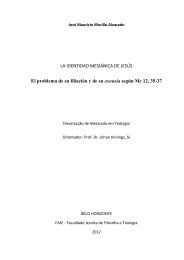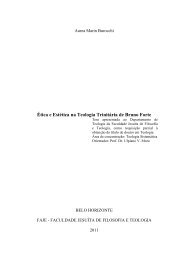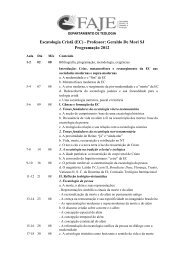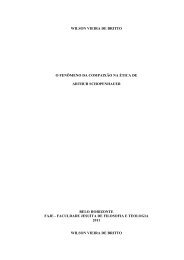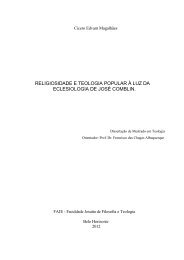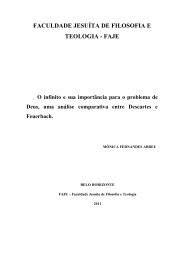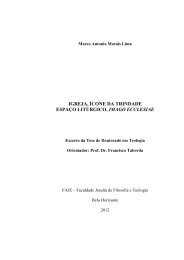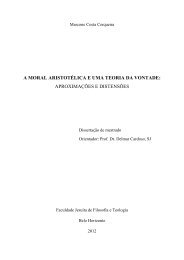o teÃsmo e o problema do mal em richard swinburne - FaJe
o teÃsmo e o problema do mal em richard swinburne - FaJe
o teÃsmo e o problema do mal em richard swinburne - FaJe
Create successful ePaper yourself
Turn your PDF publications into a flip-book with our unique Google optimized e-Paper software.
Eu contrastarei <strong>do</strong>ravante nor<strong>mal</strong>mente ´bom` [good] com ´mau`<br />
[bad] antes que com ´<strong>mal</strong>igno' [evil], ao falar sobre as ações <strong>do</strong>s<br />
agentes e <strong>do</strong> caráter destes, e igualmente, ao falar mais geralmente<br />
sobre esta<strong>do</strong>s de coisas - <strong>em</strong>bora um agente que pratica ações<br />
muito más [bad] e seja de mau caráter seja chama<strong>do</strong><br />
apropriadamente de <strong>mal</strong>igno [evil]. Esta<strong>do</strong>s de coisas é um termo<br />
que eu uso no senti<strong>do</strong> mais amplo ao incluir as coisas que<br />
acontec<strong>em</strong> às pessoas assim como as ações intencionais que elas<br />
executam. As <strong>do</strong>res e outros sofrimentos são esta<strong>do</strong>s de coisas<br />
maus [bad], mas é inadequa<strong>do</strong> chamá-los <strong>mal</strong>ignos [evil] (como eu<br />
fiz na Introdução), mesmo que algum agente ao causar ou permitir<br />
que ocorram, estivesse fazen<strong>do</strong> um ato <strong>mal</strong>igno [evil]. Embora o<br />
<strong>probl<strong>em</strong>a</strong> que nós estamos consideran<strong>do</strong> seja chama<strong>do</strong> `o <strong>probl<strong>em</strong>a</strong><br />
<strong>do</strong> <strong>mal</strong> [evil]` (e é assim que essas palavras faz<strong>em</strong> parte <strong>do</strong> título<br />
deste livro) ele é realmente o <strong>probl<strong>em</strong>a</strong> da existência de esta<strong>do</strong>s de<br />
coisas maus [bad], de mo<strong>do</strong> que (é a minha proposta) seria mau<br />
[bad] para um agente, que pudesse impedi-las permitir que<br />
ocorress<strong>em</strong>. Mas <strong>em</strong>bora eu deva contrastar esta<strong>do</strong>s bons com<br />
esta<strong>do</strong>s maus [bad] como tais, por deferência à terminologia <strong>em</strong> que<br />
nossos <strong>probl<strong>em</strong>a</strong>s são discuti<strong>do</strong>s, quan<strong>do</strong> vier a discutir <strong>em</strong> detalhe<br />
esta<strong>do</strong>s maus na parte III e precisarei distingui-los <strong>em</strong> <strong>do</strong>is grupos,<br />
eu os subdividireii na maneira tradicional <strong>em</strong> <strong>mal</strong>es morais [moral<br />
evils] e <strong>mal</strong>es naturais [natural evils] (usan<strong>do</strong> o termo <strong>mal</strong> [evil]<br />
somente quan<strong>do</strong> precedi<strong>do</strong> implicitamente ou explicitamente pelo<br />
adjetivo relevante) 72 .<br />
Como v<strong>em</strong>os, o inglês t<strong>em</strong> nor<strong>mal</strong>mente para os <strong>do</strong>is adjetivos ´bad` e<br />
´evil` apenas um substantivo ‘evil`, usa<strong>do</strong> para designar tanto o ´<strong>mal</strong> físico`<br />
(natural evil) como o `<strong>mal</strong> moral` (moral evil) Entretanto, ao passo que o<br />
adjetivo ´bad` pode assumir as mais diversas conotações, `evil` quase s<strong>em</strong>pre<br />
se refere à má vontade, razão pela qual o traduzimos no texto acima por ´mau`<br />
no senti<strong>do</strong> de ´<strong>mal</strong>igno`. Ora, na terminologia de Swinburne, ´bad` qualifica<br />
algo mau, toma<strong>do</strong> apenas a partir de seus efeitos, como um fato, ou seja,<br />
72 “I shall henceforward nor<strong>mal</strong>ly contrast the ‘good’ with the ‘bad’ rather than with the ‘evil’, both<br />
when talking about the actions of agents and their characters, and also when talking more<br />
generally about states of affairs—though an agent of very bad actions and character is<br />
appropriately called evil. ‘States of affairs’ is a term which I use in the widest sense to include<br />
the things that happen to people as well as the intentional actions they perform. Pains and other<br />
suffering are bad states of affairs, but it is odd to call th<strong>em</strong> evil (as I did in the Introduction),<br />
even if some agent causing th<strong>em</strong> or allowing th<strong>em</strong> to occur would be <strong>do</strong>ing an evil act. Although<br />
the probl<strong>em</strong> with which we are concerned is called ‘the probl<strong>em</strong> of evil’ (and so those words<br />
form part of the title of this book) it is really the probl<strong>em</strong> of the existence of bad states of affairs,<br />
such that (it is claimed) it would be bad for an agent who could prevent th<strong>em</strong> to allow th<strong>em</strong> to<br />
occur. But though I shall contrast good states with bad states as such, in deference to the<br />
terminology in which our concerns are discussed, I shall, when I come to discuss bad states in<br />
detail in Part III and need to distinguish th<strong>em</strong> into two groups, subdivide th<strong>em</strong> in the traditional<br />
way into ‘moral evils’ and ‘natural evils’ (using the term ‘evil’ only when preceded implicitly or<br />
explicitly by the relevant adjective).” (SWINBURNE, Richard, Providence and the Probl<strong>em</strong> of<br />
Evil, Claren<strong>do</strong>n Press, Oxford.1998. p.4).<br />
84



